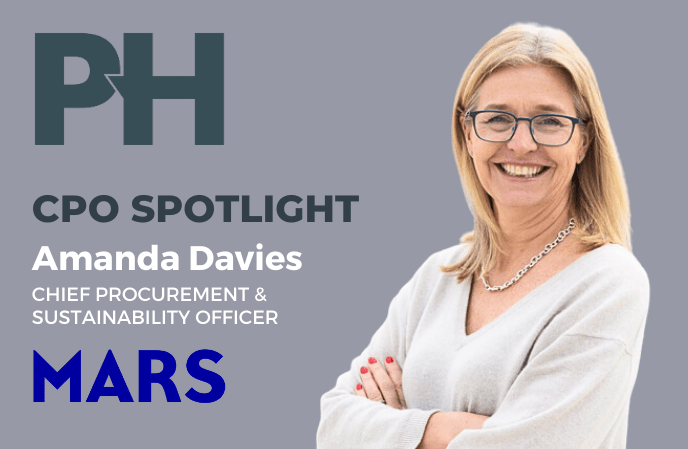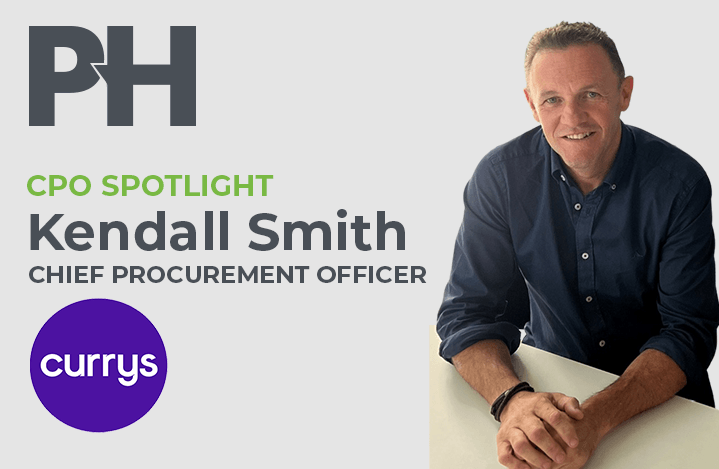Amanda Davies is Chief Procurement and Sustainability Officer at Mars Wrigley and a member of the Mars Wrigley Global Executive Team, based in Chicago, Illinois.
In her current role, she is responsible for connecting the dots between Mars Wrigley’s sustainability goals and the needs of their supply chain.
Amanda oversees the environmental impact of more than 15,000 suppliers that Mars works with, while also unlocking the possibility that their suppliers and partners can bring into the business and in connecting it to the company’s purpose.
Although now living in Chicago with her family, Amanda is originally from the UK.
She attained a Chemical Engineering degree from the University of Cambridge and started her career with the Ford Motor Group, before joining the Mars family as a management graduate trainee.
Before joining the procurement division, she spent time in R&D and HR and for Procurement Heads’ latest CPO Spotlight she spoke to Sagar Bhardwaj about her career.
Could you tell us a little bit about your journey to becoming Chief Procurement and Sustainability Officer for Mars Wrigley?
I was choosing between the oil industry and being a consultant and then I stumbled upon the Mars leadership programme and thought it just gave me this fabulous opportunity to learn, grow and develop.
I’ve had the opportunity to do many different things while at Mars.
I started in procurement, working in packaging and how to benchmark packaging around the world and look for opportunities to optimise.
Since then I have worked in the supply chain, running the inbound logistics for our factory in Slough, I went to the Czech Republic, where I had the opportunity to work on a factory build, building a factory in a foreign language, putting wrapping machines in.
I then did some cocoa trading, before several years of going deep into packaging as a category which I did for about five years.
In the years to come I would step into leadership positions heading up R&D, then HR for some years followed by the opportunity to move back towards Procurement as a Regional Vice President for Commercial
Why did you move back into procurement and sustainability?
I spent some time doing some integration work as we brought our businesses together with Wrigley and chocolate, then had the really exciting opportunity to go on a career and family adventure and move to the USA.
I moved to head up our global categories for Mars Wrigley, it was my first opportunity to go deep into sustainability and try to understand that combination of impact today in a P&L and impact for our planet and our broader society.
It was the most amazing role, where I met 100 different farmers in 20 different countries and understood some of the challenges of sustainability and stood in fields and was able to think about how we could create breakthrough strategies to address business needs and also some of the sustainability challenges.
I did that for two and a half years and then got promoted to become the indirect CPO of Mars Inc, I did that role for about 18 months around a huge business transformation, and then was delighted to get a phone call about two years ago to move into this job, which is the job I dreamed of, or dared to dream of when I joined the business of as a graduate 27 years ago.
How much has the business and the procurement function changed over the time that you’ve been?
Before I talk about what’s changed, I sit here in a meeting room looking towards our five principles.
Those are the things that have been absolutely consistent in the last 27 years.
The principles are: Quality, Responsibility, Mutuality, Efficiency and Freedom.
The thing about procurement at Mars is this element of mutuality so really understanding that if you create mutual value across a relationship, it will endure and it will stay.
While that has been consistent, I think the relevance of really deep partnerships is something that is so important today because some of the challenges that we have to work on together with our extended supply chain will not be solved in the next month, quarter or year. We have some things to work on that are going to be generational challenges.
Let’s talk about Sustainability within these changes…
We have signed up to be net zero by 2050 as a business. I’m very, very committed to reductions across our supply chain, which is going to require lots of partnerships.
In the last three weeks, I’ve been with two of our transformational partners in the fields, I’ve been in almond fields, I’ve been on dairy farms next to farmers, asking what are we going to do about greenhouse gas?
How are we going to reduce this? What is going to need to happen?
In recent years we’ve had geopolitical issues, we’ve had the pandemic, global supply chain issues and, of course, a wider focus on sustainability and a more sustainable procurement supply chain function.
How have you seen the profile of procurement within the Mars group develop with all of this in mind?
This is honestly one of the reasons why 27 years into my career at Mars I am thriving.
I have been so privileged that this has never been a fight I’ve ever had to participate in because Procurement’s seat at the table has been there for two decades.
That goes back to some of the family’s belief in the role that procurement can play in a business if you want to sell it well and make it well, you have to buy it. It goes back to the importance of our partnerships, to the business strategy.
I own sustainability for the business and I think that the whole focus on sustainability is one that is very much at the heart of the business.
I am procurement and sustainability, which is a great responsibility, but also a great opportunity for me as a procurement leader.
Do you feel like we will increasingly see the role of the CPO evolve to incorporate sustainability into the job description?
I may be talking with an element of bias because that is my job but it just makes complete sense because solving some of the biggest challenges we have with climate is going to require collaboration across our extended supply chain, if anybody says “I know how to do this alone”, I just wouldn’t believe them.
Why wouldn’t you ask a function whose role it is to drive partnerships with the extended supply chain to be on point for leading that change?
Of course, I’ve had to learn about sustainability and technically upskill myself.
I have got real subject matter experts in my team, but I can go into any of our big partners and say
“I don’t just want great cocoa, dairy, and sugar from a price and a quality perspective, I want you to provide me with a solution, a solution that’s got the right quality, the right service, the right price and the right impact on our planet.”
And if you ask for those four things together, you’ll be surprised by the breakthrough solutions that our partners will create for us.
We’ve noticed a real shift in the profile of Procurement in Leadership with many CEOs coming from the Procurement & Supply Chain teams rather than the traditional Finance or Commercial team – what are your thoughts on this?
It starts with Procurement having the self-confidence in the role they should be playing and not simply the one that the business may invite them – any procurement leader should be sitting there knowing what they can offer and the impact it can have.
I always say I am the most resourceful leader on a leadership team because I have the tailwind of all my partners, all of their efforts, and all of their energy.
Sometimes there’s nothing that frustrates me more than procurement saying, “We need to have a seat at the table, the business needs to understand how important we are.”
No, no, no.
It’s not the responsibility of the business. It’s the responsibility of procurement leaders to understand and demonstrate the impact they can have and not wait to be invited in.
What are some of the key challenges you’re facing?
I think this is three-sided.
The first thing is you have to equip leaders to understand what sustainability is and more importantly be clear on also what their role within that is.
The second challenge is the quality of the data…. and the third is timeframes!
We’re talking about timeframes that can be up to a decade to drive change which is quite a different leadership muscle. Your investment today may not bear its future fruits for a decade which is a challenge we must and are actively working on overcoming.
You’ve spoken about empowering your leaders, making sure that you’ve got the right skill set and knowledge and ability… What is it you’re looking for when hiring them?
Of course there’s the technical expertise that you look for and that’s your due diligence in terms of starting point. I would then be looking for the skills of the future and their ability to be digitally savvy is definitely one of those.
Really what I look for is courageous vulnerability.
So it’s a combination of somebody who can see what needs to be done and is brave and courageous enough to step out of the norm and offer some break through thinking when it’s needed. Being brave enough to do this whilst also being vulnerable enough to know when to ask for help to keep themselves safe is so important.
There’s nothing I love more than finding people with that amazing blend of courage and vulnerability.
The rest is nice, but those are the two things that I really get that excited feeling in my belly when I find talking to new talent.
If you enjoyed this article you might also like our full range of Procurement industry insights. Find them here






